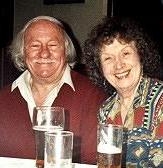 Some
years ago I was very pleased to learn that the trumpeter Gracie Cole had
received the Freedom of the City of London. Let me tell you what I remember
about Gracie, and some of the other girls who battled on, often at great
odds, in a manís world of professional musicians.
Some
years ago I was very pleased to learn that the trumpeter Gracie Cole had
received the Freedom of the City of London. Let me tell you what I remember
about Gracie, and some of the other girls who battled on, often at great
odds, in a manís world of professional musicians.
I remember meeting some of the girls in the Ivy Benson band at the Villa Marina in the Isle of Man, back in the 1950s. I was working with Jack Parnellís band at another dance hall just along the promenade. Both halls seemed to be packed out every night. I listened to Ivy's band. It was good, very good. We may have been louder, more aggressive maybe, but they were plenty loud enough, and there was nothing wrong with the quality of the girl players. On stage, and elsewhere, too, they also looked a damn sight better than we did. And they were certainly drawing in the crowds.
All of us musicians got into a habit of visiting a certain pub in Douglas at Sunday lunchtimes, where the owner played a mean baritone sax, accompanied on piano by his wife, who looked like a mortician, was thin, compressed, and dressed entirely in black. The Benson girls were great fun and there was an enormous feeling of camaraderie between us.
Those girls managed to hold their own against us in the darts matches in that pub, and they could down a pint of beer or two and still keep their wits about them. They were damn attractive, too, all of them. I became enamoured of the baritone sax player, Joan Colefield. She had a very old Morris Cowley with a crash gearbox. I couldn't drive it but she drove me all over the island, showing me the sights, and never ground the gears once. I don't know what she was like on baritone because I never heard her play, but she was highly critical of the pub owner's performance on that instrument. She must have been pretty good to be in Ivy's band anyway.
On drums with Ivy at the time was the celebrated Paula Pyke. I say celebrated because if you ever mentioned having seen the Benson band to anyone you were invariably asked if Paula was still there. Paula was a very good drummer, and a good timekeeper. She used to count relentlessly, throughout each number: ONE, two, three, four; TWO, two, three, four, and so on. You could see her lips moving. Used to break us up.
There was a fairy bridge on the road between the airport and Douglas. Everyone passing over the bridge had to say ĎGood Morning Fairiesí or whatever time of day it was to the fairies. Otherwise theyíd get mad, and terrible things would happen to you, like your private bits would fall off and so on. The driver of the airport bus used to stop just before the bridge and warn everyone about it. Luckily we didn't have to cross it every day.
Apart from the bands of Ivy Benson and Blanche Coleman—where else could a girl musician get a job in those days? We had very many excellent girl musicians in Britain at the time, but you could have counted on two fingers the number of girls ever employed in the big name bands, and Gracie was one of them. The other one was Kathy Stobart.
Most people know that Kathy had her own group at that time, with her future husband Bert Courtley on trumpet. They both came into the Vic Lewis band when I was there in 1951.
What can one say about Kathy? She was featured in Vicís band, had her own groups and has now held the job down in Humphrey Lyttelton's band for a great many years. She has raised three boys, single-handedly, since Bert died. She must have brought immense pleasure to the millions of people who have heard her play, and is a very wonderful person. (She isnít paying me to write this.)
I met many other girls who managed to get jobs in the fringe big bands, the bands of the big London dance halls. They were all exceptionally good. I played with many of them, and they were often as good, or better, than some of guys I worked with every day in the studios. But, apart from Gracie and Kathy, I never ever saw one other girl in a big touring band, or studio session band in London. Now why do you think that was?
Some years ago, when I lived in Berlin, a secretary in one of radio stations there rang to tell me that Stan Kenton was in their studio, and he had told them that he wanted to contact me. I thought she was pulling my leg. As far as I knew, Kenton was back in the States. So I stayed at home. Next day, the baritone player with Kenton, Roy Reynolds, called me to say that they had indeed been in the studio, and had made some recordings. He also told me that there were two girls in the sax section.
Now that was a surprise. Up to then I donít believe that any American bands had employed women musicians. Maybe Melba Liston and Lorraine Geller had played in some of the bands, way back, but there have been no others in any of the contemporary bands that Iíve heard of.
Not long after that happened I played in a band that Al Porcino had gotten together in Munich, and he had three girls in the band, two in the saxes and one on trombone. This band was playing mostly Al Cohn, Thad Jones and Bob Brookmeyer arrangements that Al had picked up from some of the bands heíd worked with. The arrangements were very, very complicated and difficult enough for anyone to play. The girls just sailed right through them.
When I was in Slide Hamptonís band in Berlin, we had an American girl called Carole Dawn Reinhart on third trumpet as a dep one night, and she read the book at sight. With her long blonde hair and miniskirt she looked to be about fourteen years old, but boy, could she play.
Bobby Lambís daughter taught my niece to play the flute. She (Bobís daughter) had a job in a theatre orchestra in town at the time. Even that was new, because in days gone by we only used to see girls playing the occasional oboe and stringed instruments in the theatre and studio orchestras. (There was a wicked story circulating at the time that the devastatingly handsome oboe virtuoso Leon Goosens was the reason that many girls decided to take up the instrument, in the hopes of being taught by him.) In the Parnell TV orchestra the only woman I ever saw was the very elegant and dignified Russian lady harpist, Countess Marie Korchinska.
The fact that there are now so many women musicians, involved in the extremely difficult business of big-band playing, is heartening. Times have obviously changed because, as in most other walks of life, the girls had to fight really hard for equal rights in the music business. No wonder then that very few girls had even tried to learn trumpets, trombones and saxophones. They were considered as being men’s instruments, and women were supposed to keep their hands off them.
I once worked together in the Squadronnaires Dance Orchestra with Gracie Cole, and I'm ashamed to say that I behaved very badly towards her. The only reason I did so was because she was a girl. We were both in a menís band, and I thought, for that reason alone, that she had absolutely no right to be there. Bill Geldard, her husband, was in the band on first trombone, but that didnít stop me.
I met Gracie many years later,
after a gap in our acquaintance of nearly forty years. No doubt, as far
as she was concerned, it wasnít half long enough. I was not expecting
to ever see her again, and the shock was so great that I fell on to my
knees before her and begged 
First of all she wasnít playing loud enough for me in the section. I have since heard, from many other trumpet players of that period, that I myself was more than exceptionally loud. Stan Reynolds told me recently that he had never seen any other trumpet player play a high F# and blow his second valve slide right across the room while he was doing so. I didnít remember that incident, but I do remember once breaking off the right hand finger-ring of my trumpet on a high note, pulling it right away with my death-grip, and punching myself in the face. It is clear that I was not an advocate of the no pressure system of trumpet playing. Later in life I lost a good part of my hearing, which probably explains everything—I just didnít realise how loud I was at the time. (Photo: Gracie and Ron at the Tommy Sampson Reunion)
Sitting on the other side of me in the Squads was wee Archie Craig, who, as far as I was concerned, didnít manage to play even half as loud as Gracie, but of course I never said anything to him, because he was a man. Being a Scot as well he most likely would have thumped me.
Poor Gracie: she came on stage radiant in gorgeous chiffon and taffeta evening gowns, beautifully made up, exquisitely perfumed, worked perfectly with the section and played very many superb trumpet solos.
Whatever she did, though, and however well she did it, I was against her. Yet, in spite of my ill-mannered behaviour, Gracie remained dignified, correct, ladylike. Maybe she even understood me better than I did myself. But Iíll bet she was glad when she'd left the band, and didnít have to put up with me any more.
Girls are always judged by menís standards whenever they enter a venue previously understood to be a manís realm. Of course girls are generally speaking less powerfully built than men. Having said that: I wouldnít give much for the chances of any man who tried to attack my wife. Lay an unfriendly hand on her, and she would most likely give him a simple overhead throw, followed by a mae-geri kick, two fast yoko-tobi-geri and a fumikomi, finishing up by breaking both of his arms and legs. Sheís a tough one, is my Conny. Maybe that's what Gracie should have done to me all those years ago.
I've otherwise always been a great admirer of girls—late in life I have come to realise that they can usually do most things much better than men. My great friend, the Swedish trombone player Åke Persson, alas long departed from this earth, once told me that his Czechoslovakian girl friend could play the piano, cook, make furniture, paint pictures, fix cars, own a television cable factory, talk to dogs and much much more. In short she could do everything better than he. I am never going to let her get her hands on my trombone, he said.
Which brings me, having already donned my hair shirt, beaten my breast, and apologised, to say that I am more pleased than anyone could imagine that the City of London saw fit to bestow such an honour upon our Gracie, and would like to offer my love, honour and respect to her, and to all of you lovely and wonderful girl musicians, wherever you may be. Bless you.
See the great new Ivy Benson website
Copyright © 2001, Ron Simmonds. All Rights Reserved.